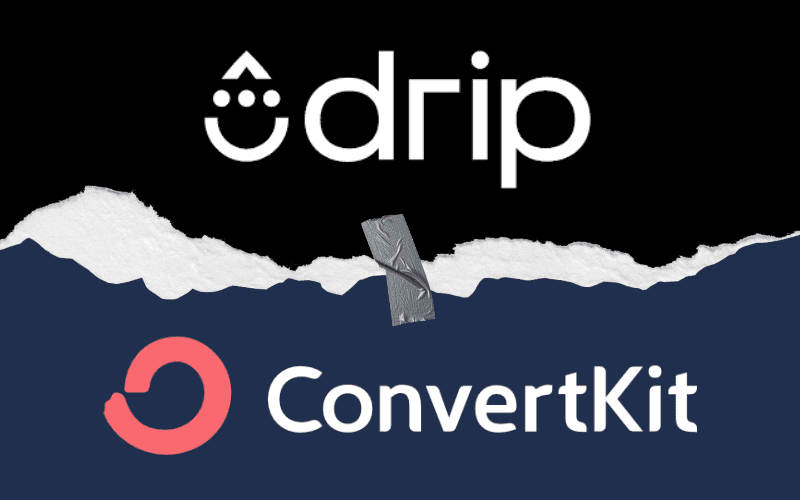Choosing the best email marketing platform is crucial for businesses looking to excel in automated email marketing, with Drip vs ConvertKit being two of the top contenders. You might be struggling to find the perfect platform that fits your specific needs, whether it’s advanced automation for your e-commerce business or a simple, user-friendly tool for content creation.
This decision is critical because the wrong choice could lead to wasted time, money, and missed opportunities to grow your audience.
But don’t worry—this comparison of Drip vs ConvertKit will guide you through the key features, strengths, and differences of each platform, helping you make an informed decision tailored to your goals.
In a Hurry? Here’s a Quick Summary of Drip vs ConvertKit
| Feature | Drip | ConvertKit |
| Automation Capabilities | Advanced workflow builder with detailed automations | Simple visual automation, ideal for basic needs |
| Integrations | Extensive, especially with e-commerce platforms | Focused on essential integrations for creators |
| Pricing | No free plan, scalable pricing for larger businesses | Free plan available for up to 1,000 subscribers |
| Email Design | Customizable templates, dynamic content options | Minimalist design focused on content delivery |
| Best Suited For | E-commerce businesses and advanced marketers | Bloggers, content creators, and small businesses |
Table of Contents
Ease of Use
Drip: Ease of Use
Drip features a user-friendly interface tailored for e-commerce. The dashboard is intuitive, enabling easy navigation through automation, email creation, and analytics. While Drip’s robust features may have a learning curve for beginners, its step-by-step guides and resources assist users in mastering advanced workflows.
ConvertKit: Ease of Use
ConvertKit is praised for its simplicity, appealing especially to bloggers and creators. It is quick to set up, and users can easily begin building email lists and automations. The minimalist interface ensures a straightforward experience, making it ideal for those who prefer a simple, efficient start in email marketing.
Ease of Use Comparison
- Drip Strengths: Intuitive interface, advanced features, extensive resources.
- ConvertKit Strengths: Simplicity, beginner-friendly, quick setup.
- Drip vs ConvertKit: Drip is feature-rich with a learning curve; ConvertKit excels in simplicity.
Email Design and Templates
Drip: Email Design and Templates
Drip provides a flexible drag-and-drop editor with customizable templates, allowing for visually appealing emails that can be tailored to the brand. However, the template selection is somewhat limited, which might require additional customization time.

ConvertKit: Email Design and Templates
ConvertKit adopts a minimalist approach, offering plain-text emails focused on content delivery. It provides basic HTML templates, but the options are limited, aligning with its emphasis on simplicity rather than elaborate design.

Email Design and Templates Comparison
- Drip Strengths: Customizable templates, dynamic content, drag-and-drop editor.
- ConvertKit Strengths: Simple design, content-driven emails.
- Drip vs ConvertKit: Drip offers more design flexibility, while ConvertKit emphasizes simplicity.
Automation Features
Drip Email Automation
Drip excels with a powerful workflow builder, positioning itself as one of the leading email marketing automation tools. It enables intricate automations based on customer behavior. Its features, including advanced triggers, custom workflows, and pre-built templates, are ideal for businesses requiring robust automation.
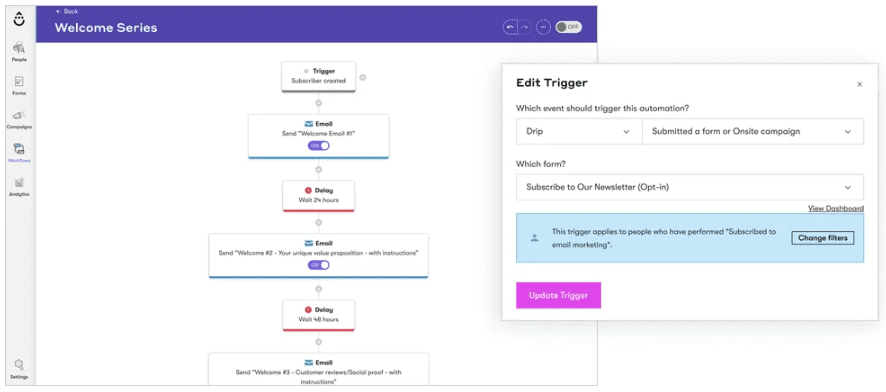
ConvertKit: Automation Features
ConvertKit offers a user-friendly visual automation builder, focusing on essential features such as tagging and sequence triggers. While simpler than Drip’s, ConvertKit’s automations effectively streamline email marketing for creators.
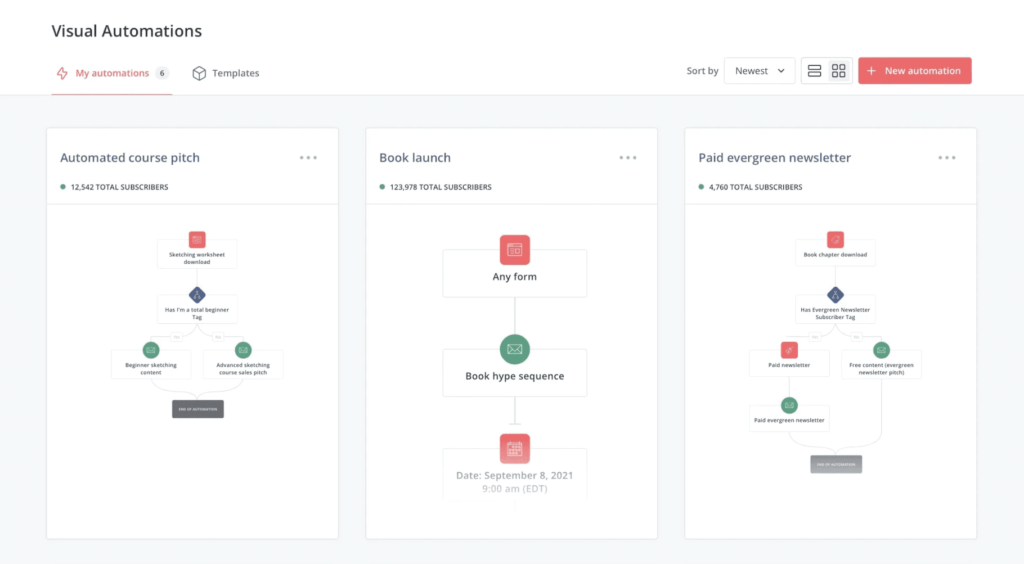
Automation Features Comparison
- Drip Strengths: Advanced automation, custom workflows.
- ConvertKit Strengths: Simple automation, easy setup.
- Drip vs ConvertKit: Drip has advanced capabilities; ConvertKit is simpler to use.
Audience Segmentation
Drip: Audience Segmentation
Drip offers detailed segmentation with tagging, custom fields, and behavior-based triggers, allowing for highly personalized campaigns. This is particularly beneficial for businesses needing detailed customer insights.
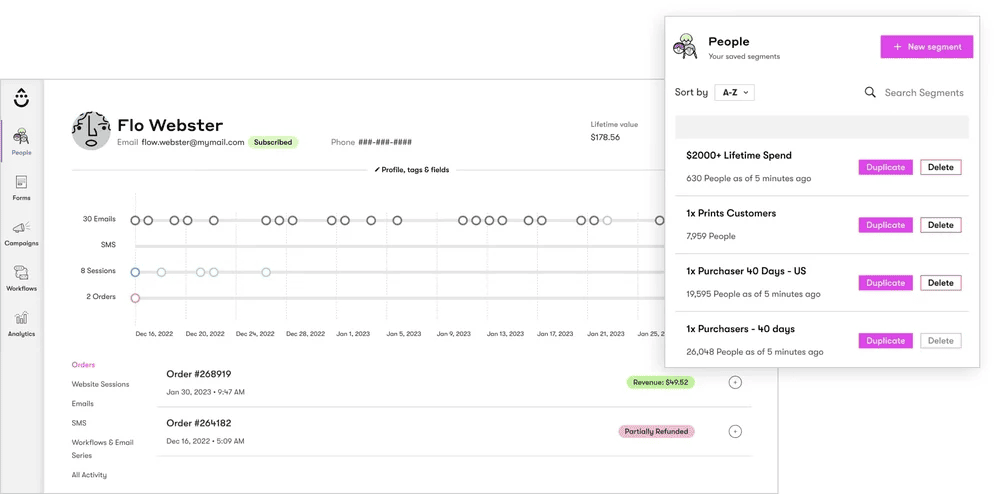
ConvertKit: Audience Segmentation
ConvertKit provides effective segmentation tools, using tags and sequences to group subscribers. While simpler than Drip’s, ConvertKit’s capabilities are sufficient for most creators, facilitating targeted content delivery.
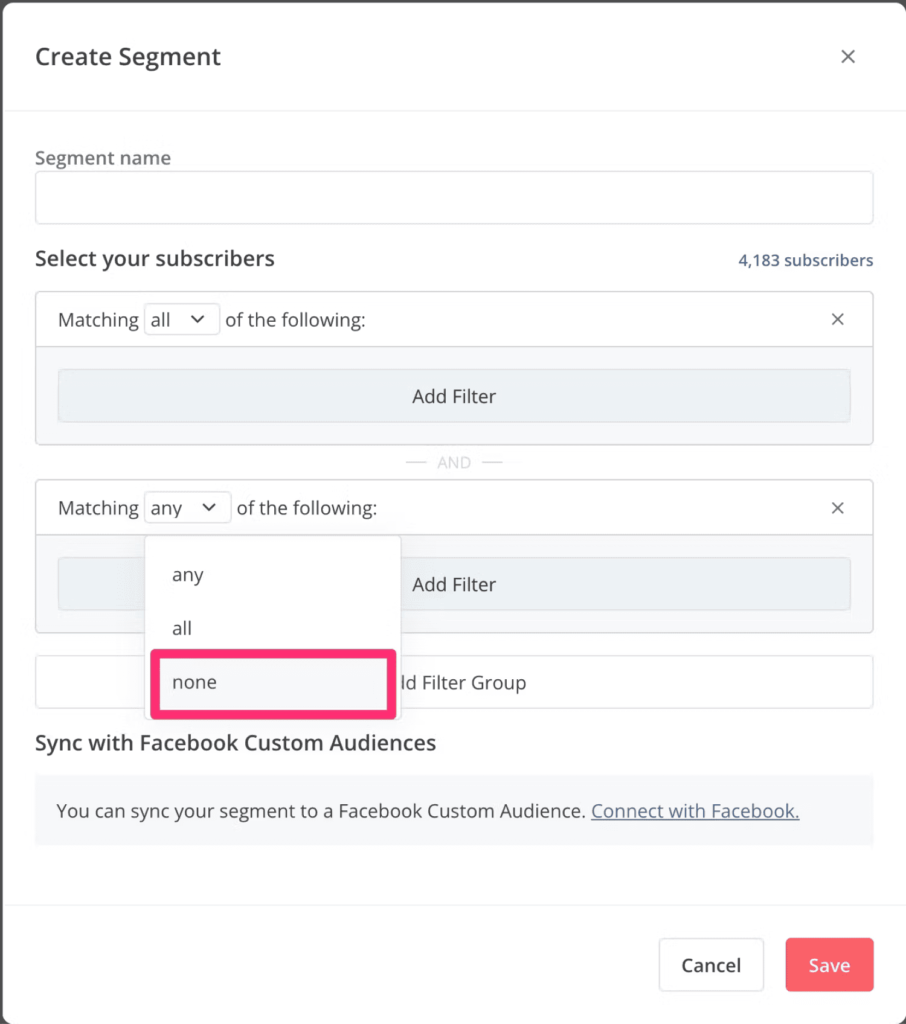
Audience Segmentation Comparison
- Drip Strengths: Advanced segmentation, behavior-based targeting.
- ConvertKit Strengths: Simple tagging, easy management.
- Drip vs ConvertKit: Drip offers advanced segmentation; ConvertKit provides a simpler approach.
Analytics and Reporting
Drip: Analytics and Reporting
Drip offers comprehensive analytics, tracking metrics like open rates, clicks, and revenue. It includes customizable reports and advanced A/B testing, giving users deep insights into campaign performance.
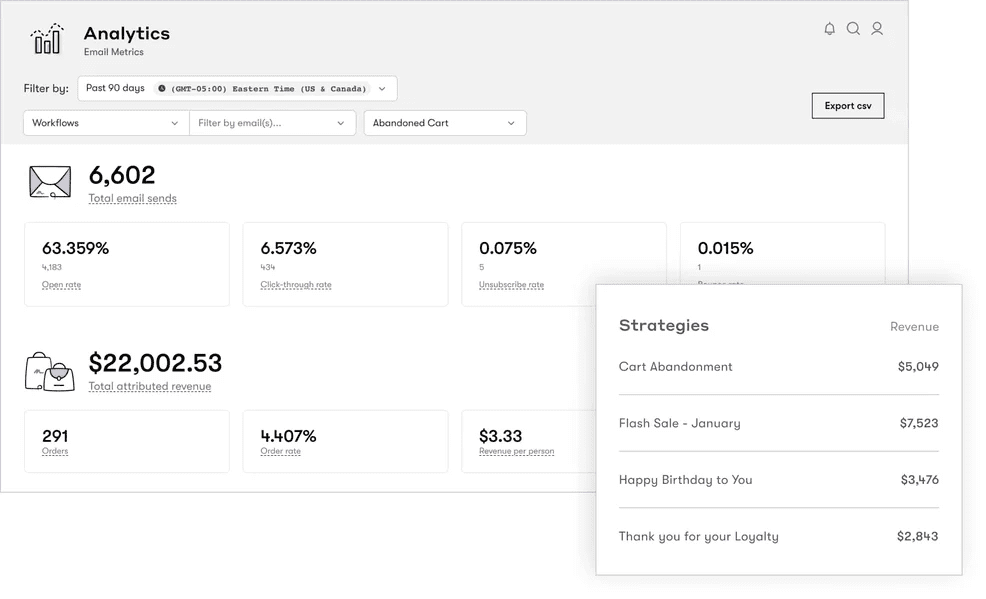
ConvertKit: Analytics and Reporting
ConvertKit provides essential analytics, focusing on core metrics such as open rates and subscriber growth. While not as detailed as Drip, its analytics are sufficient for creators needing straightforward data without complexity.
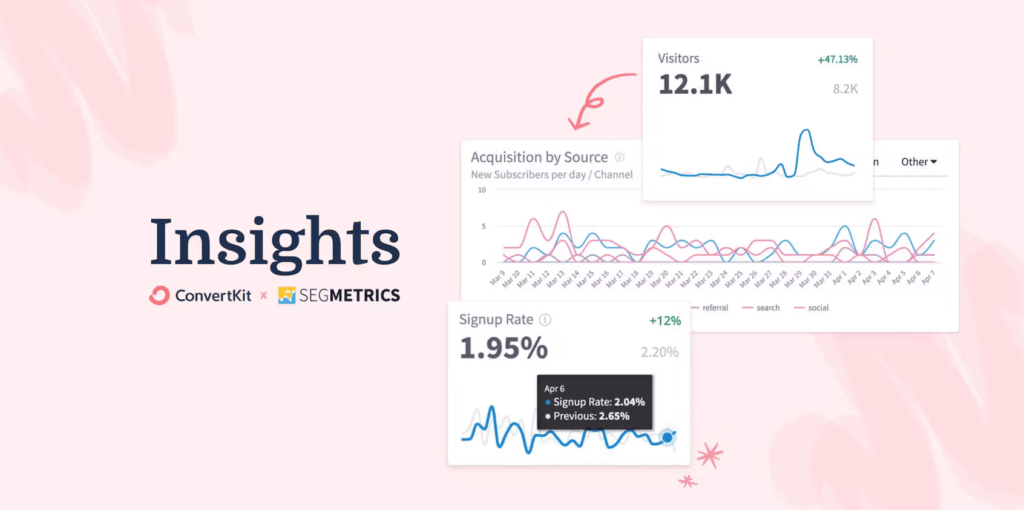
Analytics and Reporting Comparison
- Drip Strengths: Detailed analytics, customizable reports, A/B testing.
- ConvertKit Strengths: Simple, easy-to-understand analytics.
- Drip vs ConvertKit: Drip provides in-depth insights; ConvertKit offers a straightforward approach.
Integration with Other Tools
Drip: Integration with Other Tools
Drip integrates extensively with e-commerce platforms like Shopify and WooCommerce, along with CRMs, payment gateways, and other marketing tools. It offers API access for custom integrations, making it a flexible option for businesses with specific needs. This broad integration capability enhances its value for companies aiming to build a comprehensive marketing system.
ConvertKit: Integration with Other Tools
ConvertKit focuses on essential integrations for creators, such as WordPress, Teachable, and Patreon. While more limited than Drip, it covers the necessary tools for content creators. ConvertKit also provides API access, but it’s more suited for simpler setups.
Integration with Other Tools Comparison
- Drip Strengths: Extensive e-commerce integrations, flexible API.
- ConvertKit Strengths: Essential integrations for creators, simple API.
- Drip vs ConvertKit: Drip offers broader integration options, especially for e-commerce, while ConvertKit is tailored for creators.
Pricing Structure
Drip: Pricing Structure
Drip’s pricing is contact-based, scaling with business growth. Though it lacks a free plan, the pricing is competitive for the features offered, especially for larger lists. Drip’s advanced features provide good value for businesses needing robust automation and e-commerce integrations.
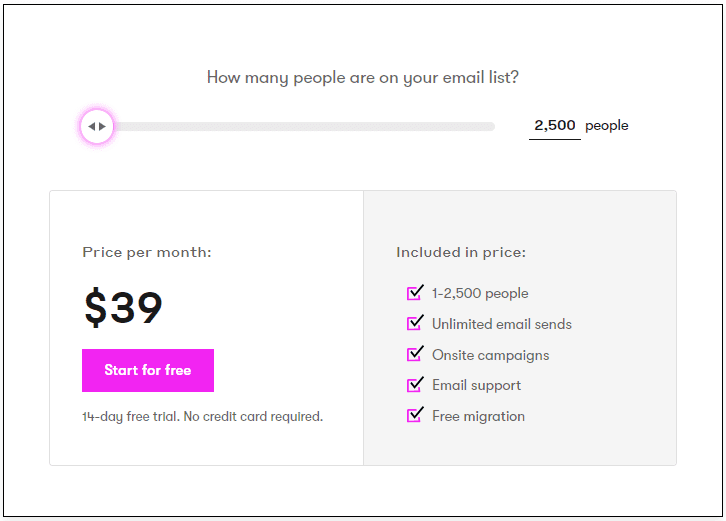
ConvertKit: Pricing Structure
ConvertKit offers a free email marketing plan for up to 1,000 subscribers, making it an attractive option for beginners. The pricing scales with list growth, remaining affordable compared to Drip. Its straightforward pricing structure makes it attractive for creators starting small and expanding gradually.
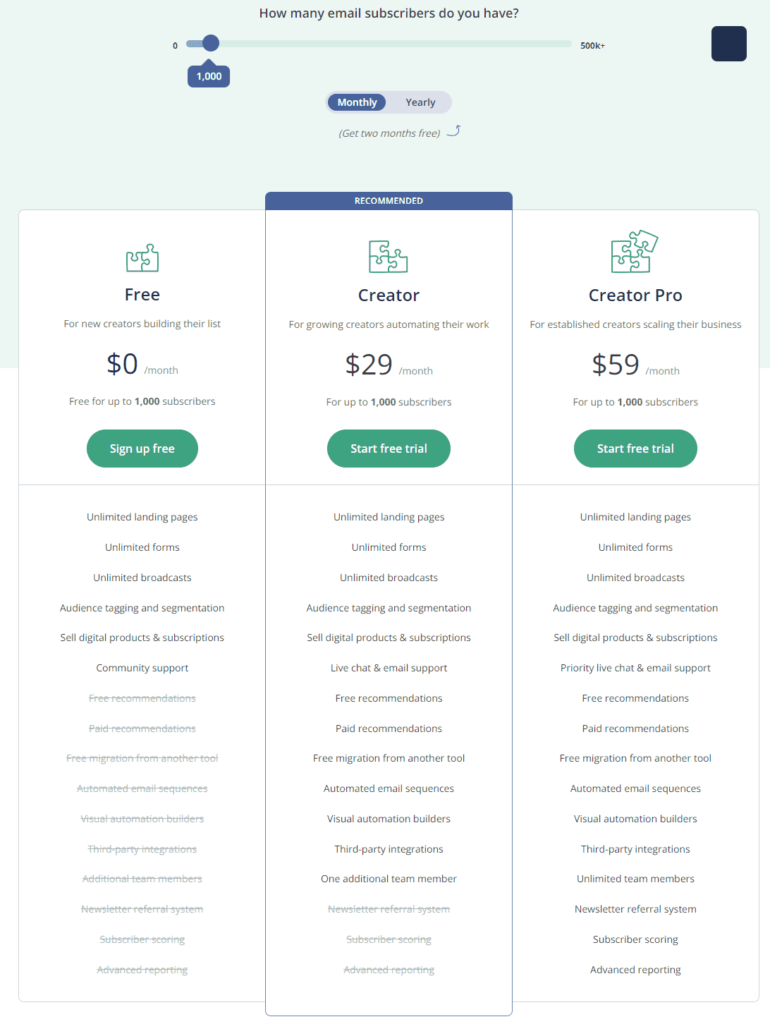
Pricing Structure Comparison
- Drip Strengths: Scalable pricing with robust features.
- ConvertKit Strengths: Free plan for beginners, affordable scaling.
- Drip vs ConvertKit: Drip is feature-rich but pricier, while ConvertKit is budget-friendly for smaller lists.
Customer Support
Drip: Customer Support
Drip offers support via email, live chat, and an extensive knowledge base, along with guides, webinars, and tutorials. While generally well-regarded, response times can be longer during peak periods, especially for complex issues.
ConvertKit: Customer Support
ConvertKit provides responsive customer support through email and live chat, with a strong focus on creator needs. Its educational resources, including webinars and a community forum, are highly praised, making support accessible and personalized.
Customer Support Comparison
- Drip Strengths: Comprehensive support, extensive resources.
- ConvertKit Strengths: Responsive, personalized support.
- Drip vs ConvertKit: Drip offers broad support, while ConvertKit excels in personalized service.
Deliverability Rates
Drip: Deliverability Rates
Drip is known for strong deliverability rates, crucial for ensuring emails reach subscribers. It includes tools like list cleaning and engagement tracking to maintain high deliverability, adhering to best practices in email marketing.
ConvertKit: Deliverability Rates
ConvertKit also ensures high deliverability, with a focus on best practices like double opt-in forms and clear list management. Its simplicity and compliance help maintain good deliverability, reducing spam risks.
Deliverability Rates Comparison
- Drip Strengths: Strong deliverability, advanced management tools.
- ConvertKit Strengths: High deliverability, focus on simplicity.
- Drip vs ConvertKit: Both excel in deliverability, with Drip offering more advanced tools and ConvertKit emphasizing simplicity.
Use Cases and Ideal Users
Drip: Use Cases and Ideal Users
Drip is best for e-commerce businesses needing advanced automation and segmentation. Its deep e-commerce integration and robust features make it ideal for companies focused on online sales and large customer lists.
ConvertKit: Use Cases and Ideal Users
ConvertKit is particularly well-suited for email marketing for bloggers, content creators and small businesses offering simplicity and essential tools that help creators grow their audience effortlessly. It’s designed to help creators grow their audience without complexity, making it ideal for those focused on content rather than intricate marketing.
Use Cases and Ideal Users Comparison
- Drip Strengths: Ideal for e-commerce, advanced features.
- ConvertKit Strengths: Perfect for creators, simple and user-friendly.
- Drip vs ConvertKit: Drip suits advanced e-commerce needs, while ConvertKit is ideal for creators seeking simplicity.
Drip vs ConvertKit – Conclusion
When comparing Drip vs ConvertKit, it’s clear that both platforms offer powerful email marketing solutions, but they cater to different types of users with distinct needs. Deciding which is the best email marketing software for your business depends largely on these specific needs.
Drip email marketing is an excellent choice for e-commerce businesses and marketers who require advanced automation, detailed segmentation, and extensive integration options. Its robust features, particularly in managing large customer lists and driving online sales, make it a go-to tool for businesses looking for a comprehensive marketing solution.
On the other hand, ConvertKit shines as a user-friendly platform tailored for content creators, bloggers, and small businesses. Its simplicity, straightforward pricing, and essential integrations make it ideal for those who want to focus on growing their audience without getting bogged down by complex features.
In the Drip vs ConvertKit debate, your decision ultimately depends on your specific needs. If you’re an e-commerce business seeking advanced features and deeper integrations, Drip may be the better option. However, if you’re a creator looking for simplicity and ease of use, ConvertKit is likely the best fit for you. Both platforms excel in their respective areas, ensuring you’ll find the right tool to meet your email marketing goals.

